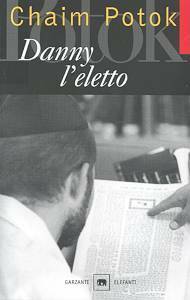Take a photo of a barcode or cover
slow-paced
Plot or Character Driven:
Character
Strong character development:
Yes
Loveable characters:
Yes
Flaws of characters a main focus:
Complicated
This book was picked up randomly out of the book room of the school that I work at simply for the fact that I had not read it. Every now and again I slip in and grab a book without reading the back. A little literary adventure into the unknown if you will.
And I was not dissappointed. I was intrigued by the setting. It was an angle of a time and place I had encountered before (America, New York, ca. 1942). It also pleased me that I had learned about Hasidic Jewish culture from A.J. Jacobs's book on living biblically. Without that prior knowledge, I'd have been lost.
The writing was clear and necessary, just the way I like it. The diction was not flowery and seemed to mirror the environment it described. Wonderfully circular that way! The imagery and symbols were there for all to see, but weren't thrown into the reader's face, again pleasing me. It reminded me of A Separate Peace only without all of Gene's ambitious whining. The protagonist of this novel actually gave a damn about someone besides himself.
I don't know that this is a novel from the book room that I will teach to my students. They would assuredly get hung up on the customs, language, and cultural differences. But I enjoyed it and know that much more about the books stacked in that room.
And I was not dissappointed. I was intrigued by the setting. It was an angle of a time and place I had encountered before (America, New York, ca. 1942). It also pleased me that I had learned about Hasidic Jewish culture from A.J. Jacobs's book on living biblically. Without that prior knowledge, I'd have been lost.
The writing was clear and necessary, just the way I like it. The diction was not flowery and seemed to mirror the environment it described. Wonderfully circular that way! The imagery and symbols were there for all to see, but weren't thrown into the reader's face, again pleasing me. It reminded me of A Separate Peace only without all of Gene's ambitious whining. The protagonist of this novel actually gave a damn about someone besides himself.
I don't know that this is a novel from the book room that I will teach to my students. They would assuredly get hung up on the customs, language, and cultural differences. But I enjoyed it and know that much more about the books stacked in that room.
A little wordy and scattered at times, but I enjoyed this one as a teen reading this for English class. It was a great coming of age story with a lot of depth put into the relationships between characters, and the internal conflict about religion and parents.
Hij leest veel, maar hij schrijft nooit. Hij zegt, dat woorden de dingen die een mens werkelijk in zijn hart voelt, verdraaien. Hij houdt ook niet zo van praten. Hij praat genoeg als we samen Talmoed studeren. Maar meestal zegt hij niet veel. Hij vertelde me eens dat hij wou dat iedereen zwijgend kon spreken.
P. 72
Thee is een zegen, zei hij glimlachend. Vooral voor een leraar die altijd lange antwoorden op korte vragen moet geven.
P. 105
P. 72
Thee is een zegen, zei hij glimlachend. Vooral voor een leraar die altijd lange antwoorden op korte vragen moet geven.
P. 105
This book made me cry on an airplane.
In a good way.
This was a WONDERFUL book.
In a good way.
This was a WONDERFUL book.
emotional
hopeful
reflective
medium-paced
Plot or Character Driven:
Character
Strong character development:
Yes
Loveable characters:
Yes
Diverse cast of characters:
No
Flaws of characters a main focus:
Yes
geniunely one of the most touching love stories i've ever read
This was a very good book. I'd never realized how much segregation there is within Judaism. I do feel like it just randomly ended. I would have liked to have seen another chapter or two. But I really enjoyed it.
Pretty good, though I wonder about what kids would read this unless they were Jewish or interested in Jewish lives in America. Potok has some great lines, certainly, but the topical span is limited. I got a bit annoyed with some of the jumps - when something suddenly happened in a sentence that had been discussed for 50 pages prior. Also, no mention of mom until page 116?
challenging
emotional
informative
reflective
sad
tense
medium-paced
Plot or Character Driven:
Character
Strong character development:
Complicated
Loveable characters:
No
Diverse cast of characters:
Yes
Flaws of characters a main focus:
Yes
Beautiful writing, but quite repetitive and plodding. It's almost all told through exposition and description than dialogue, which is central to the theme. Silence, vision, and hearing create the heart and soul of the novel. If I had to sum the whole book up in one sentence, it would be: It's about the way men experience trauma and the ways they do/do not process trauma.
Graphic: Child abuse, Chronic illness, Emotional abuse, Toxic relationship, Medical content, Grief, Medical trauma
Wow. I don't quite know what to make of this book, but the ending made me cry, and that almost never happens.
Though short, at times this was tedious. These two boys were so pure at heart that they didn't seem real, and there were giant holes in their character development (what happened to Reuven's mother? How did it affect him?) that I think a book published now would not get away with. Yet you couldn't help but love them and their friendship, and there was something really beautiful about their simplicity. And their relationships with their fathers were so poignant and heartbreaking. Reuven's father is up there with Atticus Finch, in my opinion.
I appreciate that this book taught me so much about Judaism. I think the average reader, who didn't elect to take on a 2nd major in Religion "for fun" in undergrad, may be less enthused by the sheer amount of religious discussion in the book. It did bog the pace down and was a bit excessive at points, but for the most part I found it fascinating.
I just finished the book so I still need to unpack what about the ending was so powerful to me that it brought me to tears, but I think it was a combination of the complicated nature of parent-child relationships, and parents struggling to do right by their children and often doing very wrong unknowingly, along with the deep religious convictions that often crush people with the weight of responsibility they feel it puts on them. Danny's father has a really interesting view of the soul that I definitely disagree with but want to think more about. The final interaction between Danny, Reuven, and his father was just so layered and beautiful and heartbreaking that I will be thinking about it for a long time.
Though short, at times this was tedious. These two boys were so pure at heart that they didn't seem real, and there were giant holes in their character development (what happened to Reuven's mother? How did it affect him?) that I think a book published now would not get away with. Yet you couldn't help but love them and their friendship, and there was something really beautiful about their simplicity. And their relationships with their fathers were so poignant and heartbreaking. Reuven's father is up there with Atticus Finch, in my opinion.
I appreciate that this book taught me so much about Judaism. I think the average reader, who didn't elect to take on a 2nd major in Religion "for fun" in undergrad, may be less enthused by the sheer amount of religious discussion in the book. It did bog the pace down and was a bit excessive at points, but for the most part I found it fascinating.
I just finished the book so I still need to unpack what about the ending was so powerful to me that it brought me to tears, but I think it was a combination of the complicated nature of parent-child relationships, and parents struggling to do right by their children and often doing very wrong unknowingly, along with the deep religious convictions that often crush people with the weight of responsibility they feel it puts on them. Danny's father has a really interesting view of the soul that I definitely disagree with but want to think more about. The final interaction between Danny, Reuven, and his father was just so layered and beautiful and heartbreaking that I will be thinking about it for a long time.





